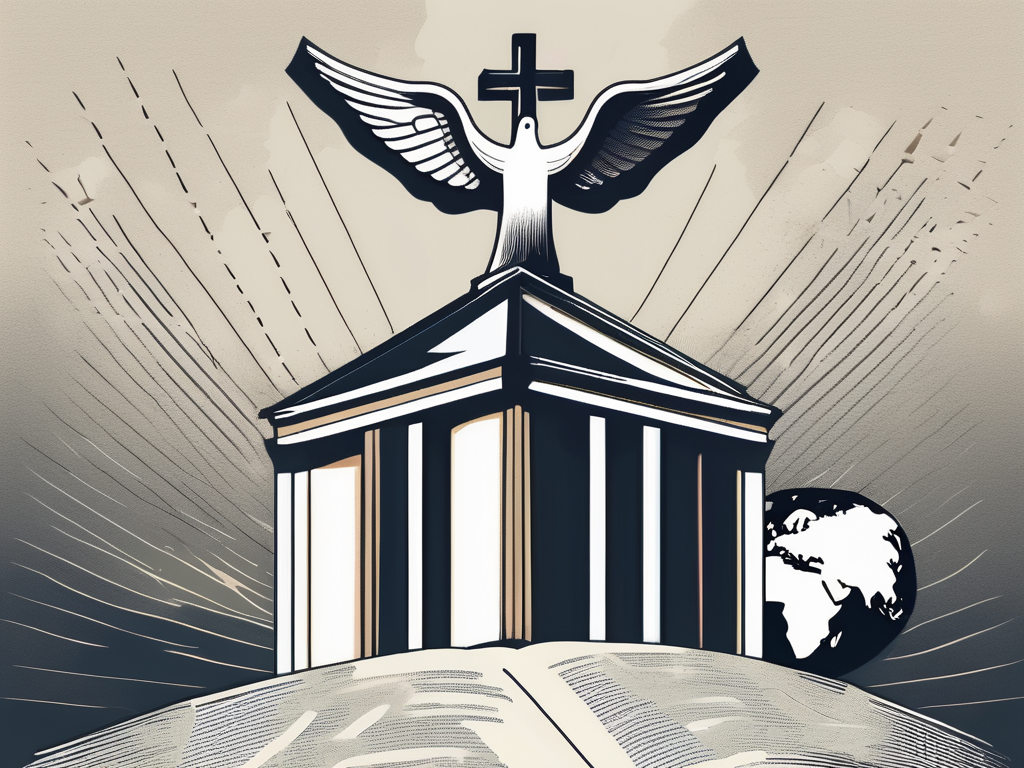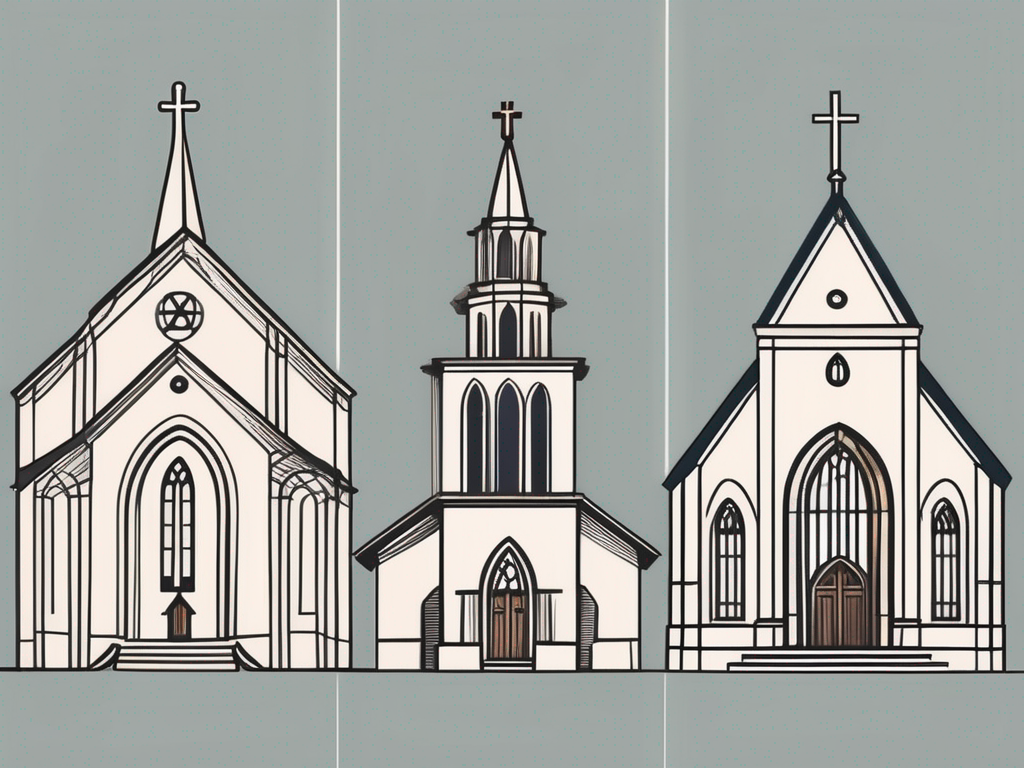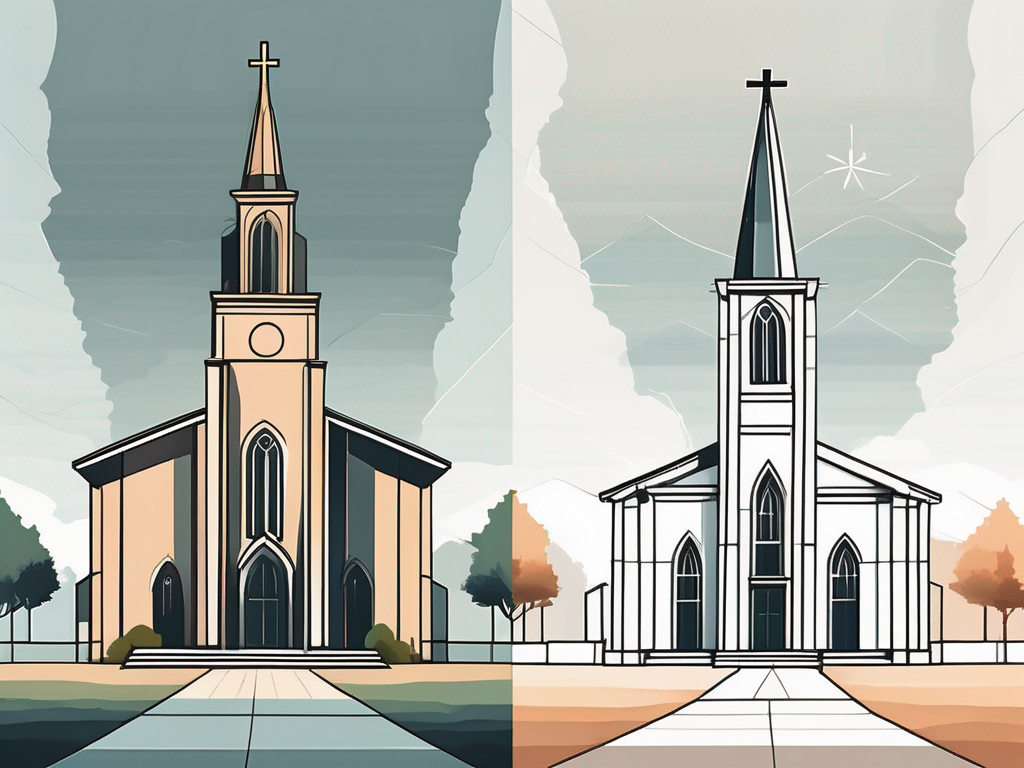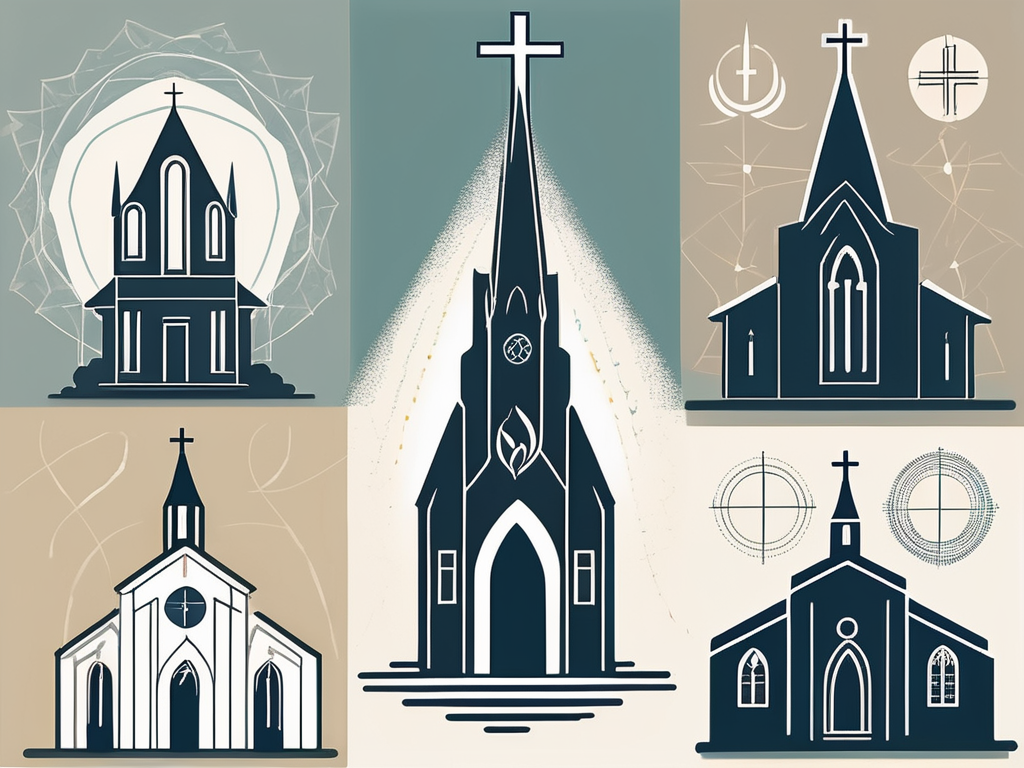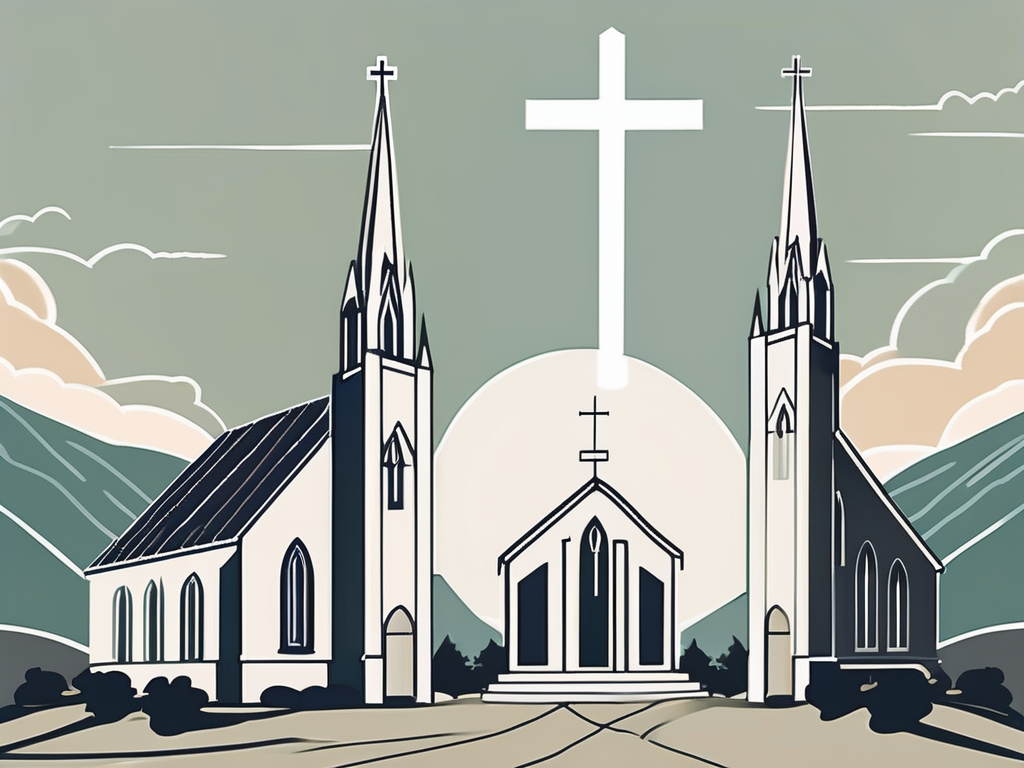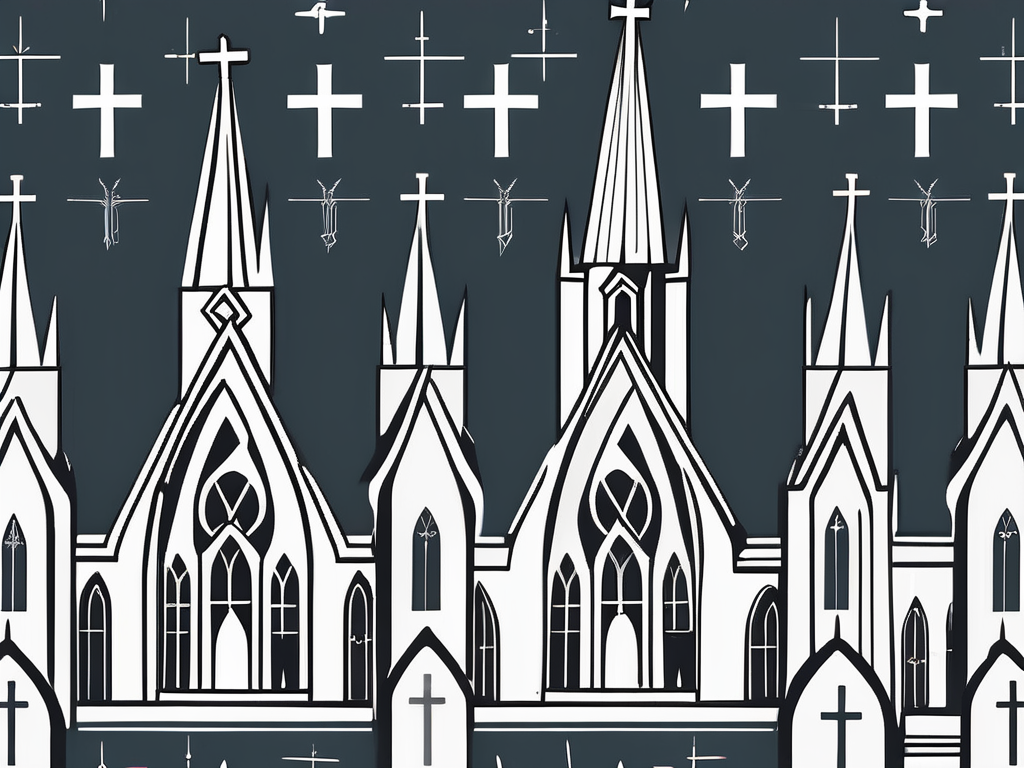In this article, we will explore the key differences and similarities between Evangelicalism and Catholicism. While both are branches of Christianity, they have distinct beliefs and practices that shape their respective communities. Let’s dive in and understand the basics of these two faith traditions.
Understanding the Basics: Evangelicalism and Catholicism
First, let’s define Evangelicalism. It is a diverse movement within Protestant Christianity that places a heavy emphasis on the authority of the Bible and the personal experience of faith. Evangelicals believe in the importance of a personal relationship with Jesus Christ and actively sharing the gospel with others.
Evangelicalism is a vibrant and dynamic movement that has had a significant impact on Christianity worldwide. It emerged in the 18th century as a response to the perceived spiritual decline in Europe. Evangelicals sought to reinvigorate the faith by focusing on the Bible as the ultimate authority and promoting personal conversion experiences.
Evangelicals believe that the Bible is the inspired and inerrant word of God, and they place great importance on studying and interpreting it. They believe that through the Bible, God reveals His will and His plan for humanity. This emphasis on the Bible as the ultimate authority distinguishes Evangelicalism from other Christian traditions.
Furthermore, Evangelicals emphasize the need for a personal relationship with Jesus Christ. They believe that salvation comes through faith in Jesus and His sacrifice on the cross. This personal relationship is seen as transformative, bringing about a new life in Christ and a desire to live according to His teachings.
Evangelicals also have a strong commitment to evangelism, which is the act of sharing the gospel with others. They believe that it is their duty to spread the message of salvation and to invite others to accept Jesus as their Savior. This emphasis on evangelism has led to the establishment of numerous missionary organizations and the active involvement of Evangelicals in social and humanitarian causes.
On the other hand, Catholicism is a global religious tradition led by the Pope and centered around the teachings of Jesus Christ. Catholics believe in the authority of the Pope and the Holy Tradition, alongside the Bible, as sources of divine revelation.
Catholicism traces its roots back to the early Christian Church and claims to have an unbroken apostolic succession from the apostle Peter, whom Catholics believe was the first Pope. The Pope, as the successor of Peter, is seen as the spiritual leader and the infallible interpreter of the faith.
In addition to the Bible, Catholics also consider the Holy Tradition as a source of divine revelation. Holy Tradition encompasses the teachings, practices, and rituals that have been passed down through the centuries. It includes elements such as the sacraments, the liturgy, and the teachings of the early Church fathers.
Catholicism places a strong emphasis on the sacraments, which are considered visible signs of God’s grace. The seven sacraments, including baptism, confirmation, and the Eucharist, are seen as channels through which believers can experience God’s presence and receive His grace.
Furthermore, Catholicism places great importance on the Virgin Mary and the saints. Mary is venerated as the Mother of God and is seen as a powerful intercessor. The saints, who are believed to be in heaven, are also seen as intercessors and role models for the faithful.
Catholicism has a rich history of art, architecture, and music. From magnificent cathedrals to intricate paintings and sculptures, Catholicism has inspired countless works of art throughout the centuries. The liturgy, with its chants, hymns, and rituals, is also a significant aspect of Catholic worship.
Both Evangelicalism and Catholicism have had a profound impact on the Christian faith. While they have distinct beliefs and practices, they both seek to follow Jesus Christ and share His message with the world. Understanding the basics of these two traditions can provide valuable insights into the diversity and richness of Christianity as a whole.
Core Beliefs and Doctrines
Now, let’s explore the fundamental beliefs held by Evangelicals and Catholics. Evangelicals place a strong emphasis on the belief in the Trinity (God as Father, Son, and Holy Spirit), salvation through faith alone, and the importance of sharing the gospel. They view the Bible as the ultimate authority in matters of faith and practice.
Evangelicals believe that God is one being who exists in three distinct persons: the Father, the Son (Jesus Christ), and the Holy Spirit. This belief in the Trinity is central to their understanding of God’s nature and character. They affirm that Jesus Christ is the Son of God, who came to earth as a human being, lived a sinless life, and died on the cross to pay the penalty for humanity’s sins. Through faith in Jesus, Evangelicals believe that individuals can be reconciled to God and receive eternal life.
Salvation through faith alone is another core belief of Evangelicals. They emphasize that salvation is a gift from God, not something that can be earned through good works or religious rituals. Evangelicals believe that faith in Jesus Christ is the only means by which a person can be saved and have a personal relationship with God. They believe that this faith is a response to God’s grace and is not based on any human effort or merit.
The importance of sharing the gospel is also central to Evangelical beliefs. They believe that it is their responsibility to spread the message of salvation through Jesus Christ to all people. Evangelicals often engage in evangelistic activities such as preaching, teaching, and distributing religious literature. They believe that by sharing the gospel, they are fulfilling the Great Commission given by Jesus to his disciples to make disciples of all nations.
On the other hand, Catholics share some common beliefs with Evangelicals, such as the belief in the Trinity and the divinity of Jesus Christ. They also believe in the importance of good works alongside faith for salvation. Catholics believe that faith and good works are inseparable and that both are necessary for salvation. They view good works as the fruit of faith and as a response to God’s grace.
In addition to faith and good works, Catholics uphold the sacraments as essential channels of God’s grace in the life of believers. They believe that the sacraments, such as baptism, confirmation, and the Eucharist, are visible signs of God’s invisible grace. Through the sacraments, Catholics believe that individuals receive God’s grace and are strengthened in their faith. The sacraments are seen as sacred rituals that connect believers to the life, death, and resurrection of Jesus Christ.
Catholics also believe in the authority of the Church, particularly the Pope and the Magisterium (the teaching authority of the Church). They view the Church as the visible body of Christ on earth and believe that it has the authority to interpret Scripture and guide believers in matters of faith and practice. Catholics see the Church as a source of unity, guidance, and spiritual nourishment.
In summary, while Evangelicals and Catholics share some core beliefs, such as the belief in the Trinity and the divinity of Jesus Christ, they differ in their understanding of salvation and the role of good works. Evangelicals emphasize salvation through faith alone, while Catholics believe in the necessity of good works alongside faith. Additionally, Catholics uphold the sacraments as essential channels of God’s grace, and they recognize the authority of the Church in matters of faith and practice.
Worship and Liturgy
When it comes to worship practices, Evangelicals and Catholics have distinct approaches. Evangelical worship is often characterized by contemporary music, enthusiastic singing, and dynamic preaching. Services may be held in churches, homes, or other informal settings.
In contrast, Catholic worship follows a more structured liturgy. Masses typically involve readings from the Bible, prayers, hymns, and the Eucharist (also known as Communion). The use of sacred symbols, such as crucifixes and statues, is common in Catholic churches.
Evangelical worship services are known for their vibrant and energetic atmosphere. The music played during these services is often contemporary, featuring a mix of genres such as rock, pop, and gospel. Worship bands, consisting of vocalists, guitarists, drummers, and keyboardists, lead the congregation in singing songs of praise and worship. The lyrics of these songs are often focused on expressing love and gratitude towards God, as well as proclaiming His greatness and faithfulness.
During Evangelical worship services, the congregation is encouraged to actively participate by clapping their hands, raising their voices, and even dancing. The goal is to create an atmosphere of joy and celebration, where individuals can freely express their love and devotion to God. Alongside the music, dynamic preaching plays a central role in Evangelical worship. Preachers deliver sermons that are often passionate and engaging, using personal anecdotes, biblical teachings, and practical applications to inspire and challenge the congregation.
Catholic worship, on the other hand, follows a more formal and structured liturgy. Masses are typically held in churches, which are adorned with beautiful stained glass windows, ornate altars, and statues of saints. The atmosphere is reverent and solemn, creating a sense of awe and reverence in the presence of God.
During a Catholic Mass, the congregation participates in various rituals and prayers. The liturgy includes readings from the Bible, which are carefully selected to reflect the theme of the Mass. These readings are followed by prayers, both spoken and sung, which are led by the priest or deacon. Hymns are sung by the congregation, accompanied by an organ or choir, adding a melodic and sacred element to the worship experience.
One of the central aspects of Catholic worship is the Eucharist, also known as Communion. During this sacrament, bread and wine are consecrated and believed to become the body and blood of Jesus Christ. The congregation receives the Eucharist as a way of participating in the sacrifice of Jesus and experiencing His presence in a tangible way.
In addition to the liturgical elements, Catholic worship often incorporates the use of sacred symbols. Crucifixes, which depict Jesus on the cross, serve as a reminder of His sacrifice and redemption. Statues of saints, Mary, and other biblical figures are also present in Catholic churches, serving as visual aids for prayer and contemplation.
Overall, while both Evangelical and Catholic worship aim to honor and glorify God, they do so in distinct ways. Evangelical worship emphasizes contemporary music, enthusiastic singing, and dynamic preaching, creating an atmosphere of celebration and personal connection with God. Catholic worship, on the other hand, follows a more structured liturgy, incorporating readings, prayers, hymns, and the sacrament of the Eucharist, creating a reverent and sacred environment for worship and communion with God.
Role of Scripture and Tradition
One significant difference between Evangelicalism and Catholicism is their view on the role of Scripture and tradition. Evangelicals believe in the sufficiency and supreme authority of the Bible as the sole guide for faith and practice.
Evangelicals place a strong emphasis on the Bible as the inspired Word of God. They believe that the Bible is the ultimate authority in matters of faith and practice, and that it contains all the necessary teachings for salvation and Christian living. Evangelicals often engage in in-depth study of the Bible, seeking to understand its historical and cultural context, as well as its theological teachings.
On the other hand, Catholics recognize the importance of both Scripture and tradition. They believe that the Holy Spirit guides the Church’s interpretation of the Bible and hold the teachings of the early Church Fathers in high regard.
Catholics believe that Scripture and tradition are two sources of divine revelation, both of which are necessary for a complete understanding of God’s will. While the Bible is considered the written Word of God, tradition encompasses the teachings, practices, and beliefs that have been passed down through the centuries in the Church. This includes the writings of the early Church Fathers, the decisions of Church councils, and the teachings of the Magisterium, the official teaching authority of the Catholic Church.
For Catholics, tradition serves as a guide in interpreting and understanding the Bible. It provides a rich context and historical perspective that helps to illuminate the meaning of the Scriptures. Catholics believe that the Holy Spirit continues to guide the Church in its understanding of the Bible and that this guidance is manifested through the living tradition of the Church.
Furthermore, Catholics believe that tradition helps to safeguard the unity and continuity of the Church. It ensures that the teachings of the Church remain consistent throughout history and across different cultures and contexts. Tradition also helps to preserve the wisdom and insights of the early Christians, allowing believers to connect with the rich heritage of the Church.
While Evangelicals focus primarily on the Bible as the sole authority, Catholics view Scripture and tradition as complementary sources of divine revelation. They believe that both are necessary for a complete understanding of God’s will and for the ongoing development of the Church’s teachings and practices.
Sacraments and Ordinances
Lastly, we turn to the sacraments and ordinances celebrated by Evangelicals and Catholics. In Catholicism, there are seven sacraments that convey God’s grace, including Baptism, Confirmation, Eucharist, Reconciliation, Anointing of the Sick, Holy Orders, and Matrimony.
Evangelicalism, on the other hand, practices two ordinances: Baptism and the Lord’s Supper (also known as Communion). Baptism symbolizes the believer’s identification with Jesus’ death, burial, and resurrection, while Communion commemorates Jesus’ sacrifice on the cross.
In conclusion, Evangelicalism and Catholicism differ in their beliefs, worship practices, views on Scripture and tradition, and sacraments/ordinances. However, both groups share a common purpose in seeking a relationship with God and following the teachings of Jesus Christ. Understanding these differences can foster respectful dialogue and mutual appreciation between Evangelicals and Catholics as they journey in their faith.


